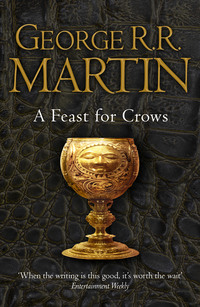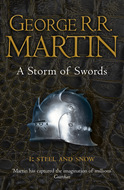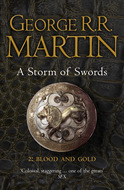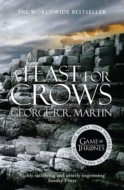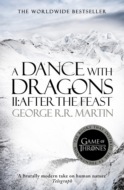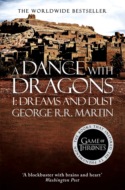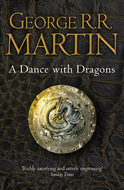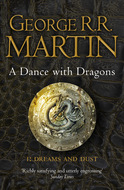Kitap dosya olarak indirilemez ancak uygulamamız üzerinden veya online olarak web sitemizden okunabilir.
Kitabı oku: «A Feast for Crows», sayfa 11
At midnight, the hinges on the Father’s Doors gave a groan as several hundred septons filed in for their devotions. Some were clad in the cloth-of-silver vestments and crystal coronals that marked the Most Devout; their humbler brethren wore their crystals on thongs about their necks and cinched white robes with seven-stranded belts, each plait a different color. Through the Mother’s Doors marched white septas from their cloister, seven abreast and singing softly, while the silent sisters came single file down the Stranger’s Steps. Death’s handmaidens were garbed in soft grey, their faces hooded and shawled so only their eyes could be seen. A host of brothers appeared as well, in robes of brown and butternut and dun and even undyed roughspun, belted with lengths of hempen rope. Some hung the iron hammer of the Smith about their necks, whilst others carried begging bowls.
None of the devout paid Jaime any mind. They made a circuit of the sept, worshiping at each of the seven altars to honor the seven aspects of the deity. To each god they made sacrifice, to each they sang a hymn. Sweet and solemn rose their voices. Jaime closed his eyes to listen, but opened them again when he began to sway. I am more weary than I knew.
It had been years since his last vigil. And I was younger then, a boy of fifteen years. He had worn no armor then, only a plain white tunic. The sept where he’d spent the night was not a third as large as any of the Great Sept’s seven transepts. Jaime had laid his sword across the Warrior’s knees, piled his armor at his feet, and knelt upon the rough stone floor before the altar. When dawn came his knees were raw and bloody. “All knights must bleed, Jaime,” Ser Arthur Dayne had said, when he saw. “Blood is the seal of our devotion.” With dawn he tapped him on the shoulder; the pale blade was so sharp that even that light touch cut through Jaime’s tunic, so he bled anew. He never felt it. A boy knelt; a knight rose. The Young Lion, not the Kingslayer.
But that was long ago, and the boy was dead.
He could not have said when the devotions ended. Perhaps he slept, still standing. When the devout had filed out, the Great Sept grew still once more. The candles were a wall of stars burning in the darkness, though the air was rank with death. Jaime shifted his grip upon the golden greatsword. Perhaps he should have let Ser Loras relieve him after all. Cersei would have hated that. The Knight of Flowers was still half a boy, arrogant and vain, but he had it in him to be great, to perform deeds worthy of the White Book.
The White Book would be waiting when this vigil was done, his page open in dumb reproach. I’ll hack the bloody book to pieces before I’ll fill it full of lies. Yet if he would not lie, what could he write but truth?
A woman stood before him.
It is raining again, he thought when he saw how wet she was. The water was trickling down her cloak to puddle round her feet. How did she get here? I never heard her enter. She was dressed like a tavern wench in a heavy roughspun cloak, badly dyed in mottled browns and fraying at the hem. A hood concealed her face, but he could see the candles dancing in the green pools of her eyes, and when she moved he knew her.
“Cersei.” He spoke slowly, like a man waking from a dream, still wondering where he was. “What hour is it?”
“The hour of the wolf.” His sister lowered her hood, and made a face. “The drowned wolf, perhaps.” She smiled for him, so sweetly. “Do you remember the first time I came to you like this? It was some dismal inn off Weasel Alley, and I put on servant’s garb to get past Father’s guards.”
“I remember. It was Eel Alley.” She wants something of me. “Why are you here, at this hour? What would you have of me?” His last word echoed up and down the sept, mememememememememememe, fading to a whisper. For a moment he dared to hope that all she wanted was the comfort of his arms.
“Speak softly.” Her voice sounded strange … breathless, almost frightened. “Jaime, Kevan has refused me. He will not serve as Hand, he … he knows about us. He said as much.”
“Refused?” That surprised him. “How could he know? He will have read what Stannis wrote, but there is no …”
“Tyrion knew,” she reminded him. “Who can say what tales that vile dwarf may have told, or to whom? Uncle Kevan is the least of it. The High Septon … Tyrion raised him to the crown, when the fat one died. He may know as well.” She moved closer. “You must be Tommen’s Hand. I do not trust Mace Tyrell. What if he had a hand in Father’s death? He may have been conspiring with Tyrion. The Imp could be on his way to Highgarden …”
“He’s not.”
“Be my Hand,” she pleaded, “and we’ll rule the Seven Kingdoms together, like a king and his queen.”
“You were Robert’s queen. And yet you won’t be mine.”
“I would, if I dared. But our son—”
“Tommen is no son of mine, no more than Joffrey was.” His voice was hard. “You made them Robert’s too.”
His sister flinched. “You swore that you would always love me. It is not loving to make me beg.”
Jaime could smell the fear on her, even through the rank stench of the corpse. He wanted to take her in his arms and kiss her, to bury his face in her golden curls and promise her that no one would ever hurt her … not here, he thought, not here in front of the gods, and Father. “No,” he said. “I cannot. Will not.”
“I need you. I need my other half.” He could hear the rain pattering against the windows high above. “You are me, I am you. I need you with me. In me. Please, Jaime. Please.”
Jaime looked to make certain Lord Tywin was not rising from his bier in wrath, but his father lay still and cold, rotting. “I was made for a battlefield, not a council chamber. And now it may be that I am unfit even for that.”
Cersei wiped her tears away on a ragged brown sleeve. “Very well. If it is battlefields you want, battlefields I shall give you.” She jerked her hood up angrily. “I was a fool to come. I was a fool ever to love you.” Her footsteps echoed loudly in the quiet, and left damp splotches on the marble floor.
Dawn caught Jaime almost unawares. As the glass in the dome began to lighten, suddenly there were rainbows shimmering off the walls and floors and pillars, bathing Lord Tywin’s corpse in a haze of many-colored light. The King’s Hand was rotting visibly. His face had taken on a greenish tinge, and his eyes were deeply sunken, two black pits. Fissures had opened in his cheeks, and a foul white fluid was seeping through the joints of his splendid gold-and-crimson armor to pool beneath his body.
The septons were the first to see, when they returned for their dawn devotions. They sang their songs and prayed their prayers and wrinkled up their noses, and one of the Most Devout grew so faint he had to be helped from the sept. Shortly after, a flock of novices came swinging censers, and the air grew so thick with incense that the bier seemed cloaked in smoke. All the rainbows vanished in that perfumed mist, yet the stench persisted, a sweet rotten smell that made Jaime want to gag.
When the doors were opened the Tyrells were amongst the first to enter, as befit their rank. Margaery had brought a great bouquet of golden roses. She placed them ostentatiously at the foot of Lord Tywin’s bier but kept one back and held it beneath her nose as she took her seat. So the girl is as clever as she is pretty. Tommen could do a deal worse for a queen. Others have. Margaery’s ladies followed her example.
Cersei waited until the rest were in their places to make her entrance, with Tommen at her side. Ser Osmund Kettleblack paced beside them in his white enamel plate and white wool cloak.
“… she’s been fucking Lancel and Osmund Kettleblack and Moon Boy, for all I know …”
Jaime had seen Kettleblack naked in the bathhouse, had seen the black hair on his chest, and the coarser thatch between his legs. He pictured that chest pressed against his sister’s, that hair scratching the soft skin of her breasts. She would not do that. The Imp lied. Spun gold and black wire tangled, sweaty. Kettleblack’s narrow cheeks clenching each time he thrust. Jaime could hear his sister moan. No. A lie.
Red-eyed and pale, Cersei climbed the steps to kneel above their father, drawing Tommen down beside her. The boy recoiled at the sight, but his mother seized his wrist before he could pull away. “Pray,” she whispered, and Tommen tried. But he was only eight and Lord Tywin was a horror. One desperate breath of air, then the king began to sob. “Stop that!” Cersei said. Tommen turned his head and doubled over, retching. His crown fell off and rolled across the marble floor. His mother pulled back in disgust, and all at once the king was running for the doors, as fast as his eight-year-old legs could carry him.
“Ser Osmund, relieve me,” Jaime said sharply, as Kettleblack turned to chase the crown. He handed the man the golden sword and went after his king. In the Hall of Lamps he caught him, beneath the eyes of two dozen startled septas. “I’m sorry,” Tommen wept. “I will do better on the morrow. Mother says a king must show the way, but the smell made me sick.”
This will not do. Too many eager ears and watching eyes. “Best we go outside, Your Grace.” Jaime led the boy out to where the air was as fresh and clean as King’s Landing ever got. Twoscore gold cloaks had been posted around the plaza to guard the horses and the litters. He took the king off to the side, well away from everyone, and sat him down upon the marble steps. “I wasn’t scared,” the boy insisted. “The smell made me sick. Didn’t it make you sick? How could you bear it, Uncle, ser?”
I have smelled my own hand rotting, when Vargo Hoat made me wear it for a pendant. “A man can bear most anything, if he must,” Jaime told his son. I have smelled a man roasting, as King Aerys cooked him in his own armor. “The world is full of horrors, Tommen. You can fight them, or laugh at them, or look without seeing … go away inside.”
Tommen considered that. “I … I used to go away inside sometimes,” he confessed, “when Joffy …”
“Joffrey.” Cersei stood over them, the wind whipping her skirts around her legs. “Your brother’s name was Joffrey. He would never have shamed me so.”
“I never meant to. I wasn’t frightened, Mother. It was only that your lord father smelled so bad …”
“Do you think he smelled any sweeter to me? I have a nose too.” She caught his ear and pulled him to his feet. “Lord Tyrell has a nose. Did you see him retching in the holy sept? Did you see Lady Margaery bawling like a baby?”
Jaime got to his feet. “Cersei, enough.”
Her nostrils flared. “Ser? Why are you here? You swore to stand vigil over Father until the wake was done, as I recall.”
“It is done. Go look at him.”
“No. Seven days and seven nights, you said. Surely the Lord Commander remembers how to count to seven. Take the number of your fingers, then add two.”
Others had begun to stream out onto the plaza, fleeing the noxious odors in the sept. “Cersei, keep your voice down,” Jaime warned. “Lord Tyrell is approaching.”
That reached her. The queen drew Tommen to her side. Mace Tyrell bowed before them. “His Grace is not unwell, I hope?”
“The king was overwhelmed by grief,” said Cersei.
“As are we all. If there is aught that I can do …”
High above, a crow screamed loudly. He was perched on the statue of King Baelor, shitting on his holy head. “There is much and more you can do for Tommen, my lord,” Jaime said. “Perhaps you would do Her Grace the honor of supping with her, after the evening services?”
Cersei threw him a withering look, but for once she had the sense to bite her tongue.
“Sup?” Tyrell seemed taken aback. “I suppose … of course, we should be honored. My lady wife and I.”
The queen forced a smile and made pleasant noises. But when Tyrell had taken his leave and Tommen had been sent off with Ser Addam Marbrand, she turned on Jaime angrily. “Are you drunk or dreaming, ser? Pray tell, why am I having supper with that grasping fool and his puerile wife?” A gust of wind stirred her golden hair. “I will not name him Hand, if that’s what—”
“You need Tyrell,” Jaime broke in, “but not here. Ask him to capture Storm’s End for Tommen. Flatter him, and tell him you need him in the field, to replace Father. Mace fancies himself a mighty warrior. Either he will deliver Storm’s End to you, or he will muck it up and look a fool. Either way, you win.”
“Storm’s End?” Cersei looked thoughtful. “Yes, but … Lord Tyrell has made it tediously plain that he will not leave King’s Landing till Tommen marries Margaery.”
Jaime sighed. “Then let them wed. It will be years before Tommen is old enough to consummate the marriage. And until he does, the union can always be set aside. Give Tyrell his wedding and send him off to play at war.”
A wary smile crept across his sister’s face. “Even sieges have their dangers,” she murmured. “Why, our Lord of Highgarden might even lose his life in such a venture.”
“There is that risk,” conceded Jaime. “Especially if his patience runs thin this time, and he elects to storm the gate.”
Cersei gave him a lingering look. “You know,” she said, “for a moment, you sounded quite like Father.”
BRIENNE
The gates of Duskendale were closed and barred. Through the predawn gloom the town walls shimmered palely. On their ramparts, wisps of fog moved like ghostly sentinels. A dozen wayns and oxcarts had drawn up outside the gates, waiting for the sun to rise. Brienne took her place behind some turnips. Her calves ached, and it felt good to dismount and stretch her legs. Before long another wayn came rumbling from the woods. By the time the sky began to lighten, the queue stretched back a quarter mile.
The farm folk gave her curious glances, but no one spoke to her. It is for me to talk to them, Brienne told herself, but she had always found it hard to speak with strangers. Even as a girl she had been shy. Long years of scorn had only made her shyer. I must ask after Sansa. How else will I find her? She cleared her throat. “Goodwife,” she said to the woman on the turnip cart, “perhaps you saw my sister on the road? A young maid, three-and-ten and fair of face, with blue eyes and auburn hair. She may be riding with a drunken knight.”
The woman shook her head, but her husband said, “Then she’s no maid, I’ll wager. Does the poor girl have a name?”
Brienne’s head was empty. I should have made up some name for her. Any name would do, but none came to her.
“No name? Well, the roads are full of nameless girls.”
“The lichyard’s even fuller,” said his wife.
As dawn broke, guardsmen appeared on the parapets. The farmers climbed onto their wagons and shook the reins. Brienne mounted as well and took a glance behind her. Most of the queue waiting to enter Duskendale were farm folk with loads of fruits and vegetables to sell. A pair of wealthy townsmen sat on well-bred palfreys a dozen places behind her, and farther back she spied a skinny boy on a piebald rounsey. There was no sign of the two knights, nor Ser Shadrich the Mad Mouse.
The guards were waving through the wayns with scarce a look, but when Brienne reached the gate she gave them pause. “Halt, you!” the captain cried. A pair of men in chainmail hauberks crossed their spears to bar her way. “State your purpose here.”
“I seek the Lord of Duskendale, or his maester.”
The captain’s eyes lingered on her shield. “The black bat of Lothston. Those are arms of ill repute.”
“They are not mine. I mean to have the shield repainted.”
“Aye?” The captain rubbed his stubbled chin. “My sister does such work, as it happens. You’ll find her at the house with the painted doors, across from the Seven Swords.” He gestured to the guards. “Let her pass, lads. It’s a wench.”
The gatehouse opened on a market square, where those who had entered before her were unloading to hawk their turnips, yellow onions, and sacks of barleycorn. Others were selling arms and armor, and very cheaply to judge from the prices they shouted out as she rode by. The looters come with the carrion crows after every battle. Brienne walked her horse past mail shirts still caked with brown blood, dinted helms, notched longswords. There was clothing to be had as well: leather boots, fur cloaks, stained surcoats with suspicious rents. She knew many of the badges. The mailed fist, the moose, the white sun, the double-bladed axe, all those were northern sigils. Tarly men had perished here as well, though, and many from the stormlands. She saw red and green apples, a shield that bore the three thunderbolts of Leygood, horse trappings patterned with the ants of Ambrose. Lord Tarly’s own striding huntsman appeared on many a badge and brooch and doublet. Friend or foe, the crows care not.
There were pine and linden shields to be had for pennies, but Brienne rode past them. She meant to keep the heavy oaken shield Jaime had given her, the one he’d borne himself from Harrenhal to King’s Landing. A pine shield had its advantages. It was lighter, and therefore easier to bear, and the soft wood was more like to trap a foeman’s axe or sword. But oak gave more protection, if you were strong enough to bear its weight.
Duskendale was built around its harbor. North of town the chalk cliffs rose; to the south a rocky headland shielded the ships at anchor from storms coming up the narrow sea. The castle overlooked the port, its square keep and big drum towers visible from every part of town. In the crowded cobbled streets, it was easier to walk than ride, so Brienne put her mare up in a stable and continued on afoot, with her shield slung across her back and her bedroll tucked up beneath one arm.
The captain’s sister was not hard to find. The Seven Swords was the largest inn in town, a four-story structure that towered over its neighbors, and the double doors on the house across the way were painted gorgeously. They showed a castle in an autumn wood, the trees done up in shades of gold and russet. Ivy crawled up the trunks of ancient oaks, and even the acorns had been done with loving care. When Brienne peered more closely, she saw creatures in the foliage: a sly red fox, two sparrows on a branch, and behind those leaves the shadow of a boar.
“Your door is very pretty,” she told the dark-haired woman who answered when she knocked. “What castle is that meant to be?”
“All castles,” said the captain’s sister. “The only one I know is the Dun Fort by the harbor. I made t’other in my head, what a castle ought to look like. I never seen a dragon neither, nor a griffin, nor a unicorn.” She had a cheerful manner, but when Brienne showed her the shield her face went dark. “My old ma used to say that giant bats flew out from Harrenhal on moonless nights, to carry bad children to Mad Danelle for her cookpots. Sometimes I’d hear them scrabbling at the shutters.” She sucked her teeth a moment, thoughtful. “What goes in its place?”
The arms of Tarth were quartered rose and azure, and bore a yellow sun and crescent moon. But so long as men believed her to be a murderess, Brienne dare not carry them. “Your door reminded me of an old shield I once saw in my father’s armory.” She described the arms as best she could recall them.
The woman nodded. “I can paint it straightaway, but the paint will need to dry. Take a room at the Seven Swords, if it please you. I’ll bring the shield to you by morning.”
Brienne had not meant to overnight in Duskendale, but it might be for the best. She did not know if the lord of the castle was in residence, or whether he would consent to see her. She thanked the painter and crossed the cobblestones to the inn. Above its door, seven wooden swords swung beneath an iron spike. The whitewash that covered them was cracked and peeling, but Brienne knew their meaning. They stood for the seven sons of Darklyn who had worn the white cloaks of the Kingsguard. No other house in all the realm could claim as many. They were the glory of their House. And now they are a sign above an inn. She pushed into the common room and asked the innkeep for a room and a bath.
He put her on the second floor, and a woman with a liver-colored birthmark on her face brought up a wooden tub, and then the water, pail by pail. “Do any Darklyns remain in Duskendale?” Brienne asked as she climbed into the tub.
“Well, there’s Darkes, I’m one myself. My husband says I was Darke before we wed, and darker afterward.” She laughed. “Can’t throw a stone in Duskendale without you hit some Darke or Darkwood or Dargood, but the lordly Darklyns are all gone. Lord Denys was the last o’ them, the sweet young fool. Did you know the Darklyns were kings in Duskendale before the Andals come? You’d never know t’look at me, but I got me royal blood. Can you see it? ‘Your Grace, another cup of ale,’ I ought to make them say. ‘Your Grace, the chamber pot needs emptying, and fetch in some fresh faggots, Your Bloody Grace, the fire’s going out.’” She laughed again and shook the last drops from the pail. “Well, there you are. Is that water hot enough for you?”
“It will serve.” The water was lukewarm.
“I’d bring up more, but it’d just slop over. A girl the size o’ you, you fill a tub.”
Only a cramped small tub like this one. At Harrenhal the tubs had been huge, and made of stone. The bathhouse had been thick with the steam rising off the water, and Jaime had come walking through that mist naked as his name day, looking half a corpse and half a god. He climbed into the tub with me, she remembered, blushing. She seized a chunk of hard lye soap and scrubbed under her arms, trying to call up Renly’s face again.
By the time the water had gone cold, Brienne was as clean as she was like to get. She put on the same clothes she had taken off and girded her swordbelt tight around her hips, but her mail and helm she left behind, so as not to seem so threatening at the Dun Fort. It felt good to stretch her legs. The guards at the castle gates wore leather jacks with a badge that showed crossed warhammers upon a white saltire. “I would speak with your lord,” Brienne told them.
One laughed. “Best shout out loud, then.”
“Lord Rykker rode to Maidenpool with Randyll Tarly,” the other said. “He left Ser Rufus Leek as castellan, to look after Lady Rykker and the young ones.”
It was to Leek that they escorted her. Ser Rufus was a short, stout greybeard whose left leg ended in a stump. “You will forgive me if I do not rise,” he said. Brienne offered him her letter, but Leek could not read, so he sent her to the maester, a bald man with a freckled scalp and a stiff red mustache.
When he heard the name Hollard, the maester frowned with irritation. “How often must I sing this song?” Her face must have given her away. “Did you think you were the first to come seeking after Dontos? More like the twenty-first. The gold cloaks were here within days of the king’s murder, with Lord Tywin’s warrant. And what do you have, pray?”
Brienne showed him the letter, with Tommen’s seal and childish signature. The maester hmmmmed and hrrrred, picked at the wax, and finally gave it back. “It seems in order.” He climbed onto a stool and gestured Brienne to another. “I never knew Ser Dontos. He was a boy when he left Duskendale. The Hollards were a noble House once, ’tis true. You know their arms? Barry red and pink, with three golden crowns upon a blue chief. The Darklyns were petty kings during the Age of Heroes, and three took Hollard wives. Later their little realm was swallowed up by larger kingdoms, yet the Darklyns endured and the Hollards served them … aye, even in defiance. You know of that?”
“A little.” Her own maester used to say that it was the Defiance of Duskendale that had driven King Aerys mad.
“In Duskendale they love Lord Denys still, despite the woe he brought them. ’Tis Lady Serala that they blame, his Myrish wife. The Lace Serpent, she is called. If Lord Darklyn had only wed a Staunton or a Stokeworth … well, you know how smallfolk will go on. The Lace Serpent filled her husband’s ear with Myrish poison, they say, until Lord Denys rose against his king and took him captive. In the taking, his master-at-arms Ser Symon Hollard cut down Ser Gwayne Gaunt of the Kingsguard. For half a year, Aerys was held within these very walls, whilst the King’s Hand sat outside Duskendale with a mighty host. Lord Tywin had sufficient strength to storm the town any time he wished, but Lord Denys sent word that at the first sign of assault he’d kill the king.”
Brienne remembered what came next. “The king was rescued,” she said. “Barristan the Bold brought him out.”
“He did,” the maester said. “Once Lord Denys lost his hostage, he opened his gates and ended his defiance rather than let Lord Tywin take the town. He bent the knee and begged for mercy, but the king was not of a forgiving mind. Lord Denys lost his head, as did his brothers and his sister, uncles, cousins, all the lordly Darklyns. The Lace Serpent was burned alive, poor woman, though her tongue was torn out first, and her female parts, with which it was said that she had enslaved her lord. Half of Duskendale will still tell you that Aerys was too kind to her.”
“And the Hollards?”
“Attainted and destroyed,” said the maester. “I was forging my chain at the Citadel when this happened, but I have read the accounts of their trials and punishments. Ser Jon Hollard the Steward was wed to Lord Denys’s sister and died with his wife, as did their young son, who was half-Darklyn. Robin Hollard was a squire, and when the king was seized he danced around him and pulled his beard. He died upon the rack. Ser Symon Hollard was slain by Ser Barristan during the king’s escape. The Hollard lands were taken, their castle torn down, their villages put to the torch. As with the Darklyns, House Hollard was extinguished.”
“Save for Dontos.”
“True enough. Young Dontos was the son of Ser Steffon Hollard, the twin brother of Ser Symon, who had died of a fever some years before and had no part in the Defiance. Aerys would have taken the boy’s head off nonetheless, but Ser Barristan asked that his life be spared. The king could not refuse the man who’d saved him, so Dontos was taken to King’s Landing as a squire. To my knowledge he never returned to Duskendale, and why should he? He held no lands here, had neither kin nor castle. If Dontos and this northern girl helped murder our sweet king, it seems to me that they would want to put as many leagues as they could betwixt themselves and justice. Look for them in Oldtown, if you must, or across the narrow sea. Look for them in Dorne, or on the Wall. Look elsewhere.” He rose. “I hear my ravens calling. You will forgive me if I bid you good morrow.”
The walk back to the inn seemed longer than the walk to the Dun Fort, though perhaps that was only her mood. She would not find Sansa Stark in Duskendale, that seemed plain. If Ser Dontos had taken her to Oldtown or across the narrow sea, as the maester seemed to think, Brienne’s quest was hopeless. What was there for her in Oldtown? she asked herself. The maester never knew her, no more than he knew Hollard. She would not have gone to strangers.
In King’s Landing, Brienne had found one of Sansa’s former maids doing washing in a brothel. “I served with Lord Renly before m’lady Sansa, and both turned traitor,” the woman Brella complained bitterly. “No lord will touch me now, so I have to wash for whores.” But when Brienne asked about Sansa, she said, “I’ll tell you what I told Lord Tywin. That girl was always praying. She’d go to sept and light her candles like a proper lady, but near every night she went off to the godswood. She’s gone back north, she has. That’s where her gods are.”
The north was huge, though, and Brienne had no notion which of her father’s bannermen Sansa might have been most inclined to trust. Or would she seek her own blood instead? Though all of her siblings had been slain, Brienne knew that Sansa still had an uncle and a bastard half brother on the Wall, serving in the Night’s Watch. Another uncle, Edmure Tully, was a captive at the Twins, but his uncle Ser Brynden still held Riverrun. And Lady Catelyn’s younger sister ruled the Vale. Blood calls to blood. Sansa might well have run to one of them. Which one, though?
The Wall was too far, surely, and a bleak and bitter place besides. And to reach Riverrun the girl would need to cross the war-torn riverlands and pass through the Lannister siege lines. The Eyrie would be simpler, and Lady Lysa would surely welcome her sister’s daughter …
Ahead, the alley bent. Somehow Brienne had taken a wrong turn. She found herself in a dead end, a small muddy yard where three pigs were rooting round a low stone well. One squealed at the sight of her, and an old woman drawing water looked her up and down suspiciously. “What would you be wanting?”
“I was looking for the Seven Swords.”
“Back the way you come. Left at the sept.”
“I thank you.” Brienne turned to retrace her steps, and walked headfirst into someone hurrying round the bend. The collision knocked him off his feet, and he landed on his arse in the mud. “Pardons,” she murmured. He was only a boy; a scrawny lad with straight, thin hair and a sty beneath one eye. “Are you hurt?” She offered a hand to help him up, but the boy squirmed back away from her on heels and elbows. He could not have been more than ten or twelve, though he wore a chainmail byrnie and had a longsword in a leather sheath slung across his back. “Do I know you?” Brienne asked. His face seemed vaguely familiar, though she could not think from where.
“No. You don’t. You never …” He scrambled to his feet. “F-f-forgive me. My lady. I wasn’t looking. I mean, I was, but down. I was looking down. At my feet.” The boy took to his heels, plunging headlong back the way he’d come.
